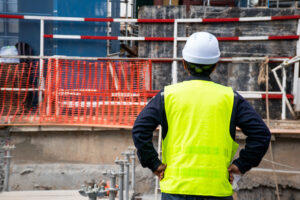How to Properly Undergo Construction and Concrete Work in the Cold

There are a handful of safety risks associated with concrete and other construction work during the winter.
We’re now in the middle of February, and it is still as cold as it’s ever been. With a handful of snow showers here and there, winter is unfortunately here to stay for a few more weeks. Even if the snow does not stick to the ground, your construction crew still has to be prepared to work outside in the elements. Winter construction jobs where employees are trying to avoid falling in slick conditions can be dangerous. There are a handful of safety risks associated with concrete and other construction work at any time of the year, but they become a bit more hazardous during the winter. Read on to learn how to undergo construction and concrete work in the cold properly!
Keep a Close Eye on the Weather
For one thing, it is vital to keep track of the weather forecast. Maryland, in particular, is known for its odd weather patterns, so you’ve got to stay on top of it. Unexpected precipitation could lead to safety risks like injuries, accidents, and even sinkholes and voids, depending on how bad the snow, rain, sleet, wind, and ice can get. Frostbite can set in quickly, so it becomes essential to take on this situation as carefully as you can with an abundance of caution.
Make Sure All Employees Bundle Up
Along the same lines, make sure all concrete workers have the right PPE they need. This goes far beyond equipping hard hats, reflective vests, and steel-toed boots. Various clothing layers can help reduce the overall chances of hypothermia and frostbite from affecting your construction crew. Although it may be overlooked during training sessions, make sure your workers can keep their mouths, hands, necks, and faces covered and protected. Likewise, fog-proof goggles and glasses have to be worn, considering how all construction workers will need to protect themselves from the wind chill, while ensuring visibility is essential, especially since darkness falls early in the winter.
Make Sure that Machinery and Vehicles Are Prepared
You will want to inspect all your work vehicles and machines that your work crew will be using. Engine oils and hydraulic fluids have to be winterized, so they do not freeze over. Antifreeze oil could also prevent any moisture infiltration from causing hoses or pneumatic to fail due to the cold weather.
Prepare the Worksite
Keeping the worksite prepared for your crews to come out and work is required. First of all, debris and stray tools might cause issues even on a normal workday. Snow and freezing rain can cause slipping, tripping, and failing. Ladders, stepstools, and scaffolds call for many precautions as it is, but as the winter rapidly approaches, make sure to double down on these measurements to minimize the possible safety risks!
Revitalize Your Business with G&M Services
G&M Services is proud of our employees and the dedication they have for safety in the workplace. We reward our employees for displaying positive safety practices. We incorporate weekly and monthly discussions and meetings to ensure that all involved know how to handle equipment and potentially risky situations during a project. We offer services in the way of concrete core-drilling and sawing, concrete scanning, Air Barriers, Firestop, and BIM Project Management and Coordination. To get started with us, call today at 410-787-8828 or visit our contact page. Follow the official company page today on Facebook, Twitter, and LinkedIn.








